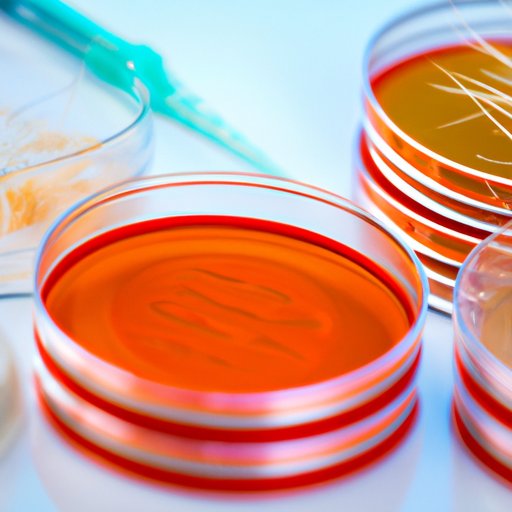I. Introduction
Pure cultures are defined as a population of cells or microorganisms that all descend from a single cell or individual by asexual reproduction. These cultures are pure because they are genetically identical, uniform, and will produce the same results each time. The importance of pure cultures cannot be overstated across different fields, such as biotechnology, environmental science, academia, food microbiology, and medical microbiology. The purpose of this article is to explore why pure cultures are crucial for scientific research and how they can help solve problems in these different fields.
II. The Importance of Pure Cultures in the Biotechnology Industry
The biotechnology industry uses pure cultures to create new medicines, vaccines, and to improve food production. Biotechnology has become a crucial tool for many industries because it allows the manipulation of microorganisms to produce the desired results. Without pure cultures, it would be impossible to conduct the necessary research and development to bring new medicines and vaccines to market. Pure cultures ensure that the results are reliable and can be duplicated for quality control.
III. The Use of Pure Cultures in Environmental Science
Pure cultures play a critical role in environmental science by helping to solve environmental problems, such as wastewater treatment, soil remediation, and bioremediation. These pure cultures help to break down pollutants in the environment, which can reduce the impact of pollution and save animal and plant life. For example, in wastewater treatment, pure cultures can break down organic matter and eliminate harmful bacteria. The use of pure cultures in these applications helps to protect the environment and human health and ensures that the desired results are achieved.
IV. The Significance of Pure Cultures in Academic Research
Pure cultures are also essential for scientific research. Impurities in cultures can have a significant impact on experiments, leading to unreliable results. Maintaining pure cultures is, therefore, necessary to ensure the reproducibility and reliability of scientific research. Additionally, pure cultures play an essential role in the development of new technologies and methodologies required for specific scientific research.
V. The Role of Pure Cultures in Food Microbiology and Safety
Pure cultures are essential in the food industry to prevent foodborne illnesses and ensure food safety. Different types of pure cultures are used in this context, such as lactic acid bacteria, yeast, and molds. These microorganisms can help prevent the growth of harmful bacteria, fungi, and viruses that can cause foodborne illnesses. Pure cultures also provide food manufacturers with a consistent and predictable product with uniform quality standards.
VI. The Importance of Pure Cultures in Medical Microbiology
Pure cultures are crucial in medical microbiology for diagnosing different diseases. Different techniques are used to obtain pure cultures, such as streaking, pour plate, spread plate, and the membrane filter method. Pure cultures can be used to identify the specific microbe responsible for causing a particular disease, which helps clinicians make informed and effective treatment decisions. Additionally, pure cultures can also be used to study the growth requirements of different pathogens and develop new diagnostic methods or vaccines.
VII. Conclusion
Pure cultures are vital for different areas of scientific research. Maintaining pure cultures is necessary to ensure credibility, reproducibility, and reliability of scientific investigations. In environmental science, pure cultures help to solve environmental problems, while in the food and medical industries, they aid in the prevention of foodborne illnesses and the diagnosis of different diseases. This article highlights the importance of pure cultures and how they can help solve problems in different fields.
Audiences across different fields and levels of expertise can benefit from this article. Students, researchers, and professionals in biotechnology, environmental science, academia, food microbiology, and medical microbiology can benefit from understanding the importance of pure cultures and how they can use them to solve problems in their respective industries.
(Note: Is this article not meeting your expectations? Do you have knowledge or insights to share? Unlock new opportunities and expand your reach by joining our authors team. Click Registration to join us and share your expertise with our readers.)
